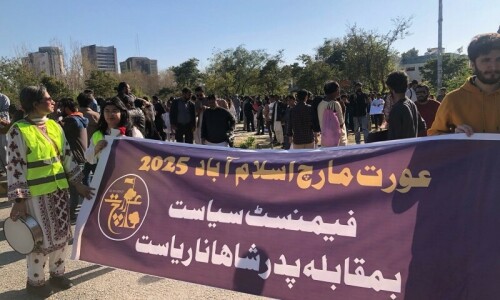HYDERABAD: The Sindh Abadgar Board (SAB) on Saturday urged the government to allow unhindered movement of cargo, commodities, fruits and vegetables in the country as well as export of fruits and vegetables to Afghanistan, Iran and other countries. It demanded that wheat procurement centres should be opened without any delay.
The board held its online meeting under the chairmanship of Mehmood Nawaz Shah in view of the present coronavirus situation in which minimal movement is recommended.
Observing that the lockdown had adversely affected agriculture in Sindh, it said that demand contraction coupled with disruptions in supply chain was increasing losses. Unlike the industrial production, the agricultural economy could not be shut and started at will, it stated.
The board said the agricultural economy due to the lockdown had suffered major losses in the business of milk, tomatoes, banana, cauliflower, green chillies, which had seen declines in rates from 40 per cent(pc) to 70pc. Lack of cold chain, processing and storing infrastructure was damaging the agricultural economy. Tomatoes and milk were being wasted as there were no buyers, it said.
The SAB said that while the overall irrigation water supply was satisfactory, there was an extreme shortage in Khairpur area, which was hampering sowing of Kharif crops. At that juncture when water was surplus, shortage in Khairpur was not understandable, it added.
It said that a ban on the movement of labour was already impacting tomatoe harvesting in Larkana and Shikarpur. Soon the labour would be required for harvesting mangoes, it said and demanded that without compromising health and with certain standard operating procedures (SOPs), their movement should be allowed and facilitated as the step would also help in employment generation in the current difficult times.
The SAB observed that wheat purchase centres had not opened yet and demanded their opening immediately as wheat harvesting was at its peak. Distribution of bardana should be done through the committee as notified for each district by the Sindh food ministry, it added.
It said that out of about 3.8m tonne of wheat production, the government would buy 25pc approximately and therefore, it was important for the government to ensure free movement of wheat. Inter and intra provincial movement of wheat should be allowed and trend of falling rates of wheat should be arrested as it had gone down from Rs1,570 to Rs1,330. This step would ensure availability of wheat in the country. Wheat stopped on the Sindh border was increasing problems for growers, the SAB said.
The meeting also noted that sunflower harvesting was in full swing and growers were promised Rs2,700 as minimum rate, but currently the rate had gone down to Rs2,300. Sunflower could be a strategic crop for Pakistan which spent over $3bn on its import; substantial quantum of foreign exchange could be saved if domestic growers were supported, it said.
Showing deep concern over lack of government support to the agriculture sector which employed 42pc of the country population, the SAB demanded that the federal and provincial governments should provide following some relief to the agricultural economy for survival.
It demanded withdrawal of sales tax on fertilizers and pesticides; waiver on well electricity bills for six months; permission for export of fruits and vegetables to Afghanistan, Iran and other countries; unhindered movement of cargo, commodities, fruits and vegetables; medium-to-long-term strategies for the-state-of-art-storages, processing and smart infrastructure to help the agricultural economy sustain shocks.
The meeting was attended by Dr Bashir Nizamani, Dr Zulfiqar Yousfani, Syed Nadeem Shah, Mehmood Nawaz Shah, Sarfaraz Junejo and others.
Published in Dawn, April 6th, 2020













































